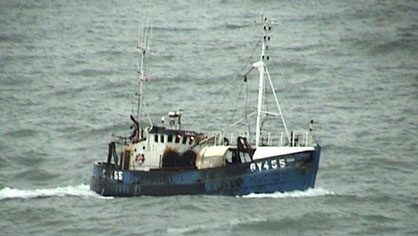14 November 2011
In direct meetings with the UK Fisheries Minister, Richard Benyon, the NFFO has emphasised that securing a halt to cuts in permitted days-at-sea must be an absolute priority for the UK, at the forthcoming December Council
The EU Cod Management Plan has been evaluated by the Commission’s Scientific, Technical, and Economic Committee for Fisheries and found to be flawed in fundamental ways, including the weakness of the link between reducing fishing effort and a consequent reduction in fishing mortality. In the past this would have meant that a new plan, which addressed these shortcomings, would have been put to the Council of Ministers for approval. However, the arrival of the Lisbon Treaty, which introduces co-decision-making with the European Parliament, raises the prospect of a delay until 2014 before the Plan can be revised. The Plan’s pre-programmed annual reductions of up to 25% in fishing effort and TACs means that parts of the fleet subject to the Cod Plan will be extinguished economically long before then.
It is imperative therefore for the Council of Ministers to intervene at the December Council to pause this part of the Plan, pending a more profound revision of the cod recovery arrangements in the North Sea, Irish Sea, West of Scotland and Eastern Channel. The NFFO, along with other stakeholders from the regional advisory councils, will be participating in a meeting later this month with STECF to discuss the contents of a revised Cod Plan.
All, parts of the NFFO back the priority given to halting the effort cuts, even those fleets and areas not directly affected. It does not need much imagination to appreciate the displacement effects of a run-away Cod Plan, with vessels forced to work outside the Cod Recovery Zone or to shift into fleet sectors that are least affected by the provisions of the Plan. One of STECF’s conclusions so far has been that the Cod Plan, because it is so blunt and poorly thought-through, has generated perverse consequences for cod recovery, such as forcing vessels to shift into small-mesh fisheries and into targeting shoaling species, including cod, because they take less time at sea to catch.
Setting annual TAC and effort limits are explicitly excluded from co-decision-making with the European Parliament and so it is clear that the Council has the legal right to depart from the pre-programmed reductions in the Cod Plan, notwithstanding the Lisbon Treaty. What is required is the political will to amend the Plan to take account of STECF’s conclusions and the unanimous advice of the North Sea and North Western Waters regional advisory councils. Although the UK is in the vanguard of those affected by the effort cuts, other member states realize that the implications for their fleets will very shortly become severe. France, Netherlands, Ireland and Denmark were assisted by the lottery of the timing of their decommissioning schemes when the effort baselines were set but that relative advantage is being rapidly eroded by the scale of the cuts requires under the plan.
Rejecting the EU Cod Management Plan and pre-programmed effort cuts does not mean rejecting efforts to rebuild the cod stocks in Community waters. It may not be a coincidence that the only area exempted from the Cod Recovery Zone, despite repeated efforts by the Commission to have it included, is the Celtic Sea where ICES have advised that a rapid rebuilding of the cod stock is underway. The RACs and STECF have both concluded that the parts of the EU Cod Plan that show most promise are those which encourage active cod avoidance, whilst restrictions on time at sea can have the opposite effect. Real Time Closures for instance become less effective if vessels do not have the time to search for low cod intensity areas. Building on the parts of the Cod Plan that have shown promise; tailoring the Plan to regional characteristics; addressing the discards issue; moving to fully documented fisheries where this is appropriate and feasible are all ways in which the plan could be improved.
The immediate priority however must be to address the pre-programmed reductions. The Council has the authority and must use it. To fail would register as one of the most catastrophic failures of the CFP to date, and would put a spotlight on the potential for policy paralysis that exists with co-decision unless more flexible and pragmatic ways of decision-making are reached.

